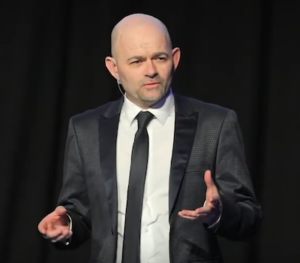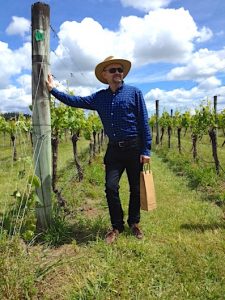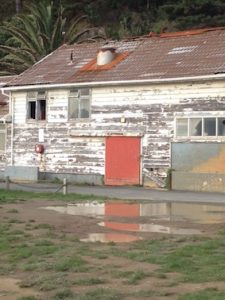
The author pitching at Lightning Lab Electric 2017
I first clapped my ears on Ghost In The Machine, the fourth album in the illustrious career of British rock band The Police, as a spotty faced teenager. The cover art for that album features images of three musicians depicted as a glitchy digital display, alluding to the concept of the human mind taking on a digital persona. Rather prescient when you consider that digital music required a stage full of computing power and miles of spaghetti wiring at the time and that this was almost 15 years before public internet arose. Artificial intelligence existed only in the fertile imaginations of authors such as Isaac Asimov and Arthur C. Clarke and their readers. So what does the future hold for digital ghosts and how do we get our timing right in what is today a rapidly evolving field?
Fast forward to 2017 and I was about to experience a brief rock star moment of my own as I spent the most terrifying five minutes of my life presenting to an audience of corporate bigwigs and various supporters. The kernel of that pitch was that machine based technologies would become integral to utilities services management. Nobody got the point and thanks to the conservative nature of the energy industry incumbents, who were sponsoring our accelerator, the project sank without a trace. We had many”learnings” along the way as a team however and I’m glad I participated.
Only six years later, AI is rapidly embedding in almost every sector and obscene sums are being invested in companies providing a vast array of offerings. For starters the venture capital industry itself is being disrupted by artificial intelligence. Deployment of capital into AI is growing faster than almost every other technology sector right now, according to industry monitor Carta. Notwithstanding some concerns over governance, AI looks set to play an increasing role in our lives.
Timing is a big part of building a successful venture. Sometimes timing is even the most significant factor, regardless of the quality of the team or the idea. I’ve got the timing wrong on more than a few occasions in my life. Ideas alone are worthless without good execution and a bit of good luck as well. In most cases, failing fast is the best possible outcome. If AI really is the ghost in the machine and the timing is right now, I wonder if it will help us be more effective entrepreneurs, govern more wisely and be better guardians of the planet?
Paul Spence is a commentator, researcher and serial entrepreneur, a previous co-founder of a successful New Zealand based global technology venture, co-founder and director of Creative Forest, principal at GeniusNet Research & SondXF and an advisor at ThincLab. You can follow Paul on Twitter/X @GeniusNet or sign up for a free weekly digest of startup, tech and innovation related events co-curated by him through New Zealand Startup Digest.

 This week I conducted a small experiment. I really want to play my part to reduce emissions, so I’m in the market for a plug-in hybrid electric vehicle (PHEV). I’ve also been doing a couple of papers at our local university for interest recently and have just completed a marketing course at Masters level. So I’m up to speed with marketing tactics and sneaky selling strategies. This is where the fun begins.
This week I conducted a small experiment. I really want to play my part to reduce emissions, so I’m in the market for a plug-in hybrid electric vehicle (PHEV). I’ve also been doing a couple of papers at our local university for interest recently and have just completed a marketing course at Masters level. So I’m up to speed with marketing tactics and sneaky selling strategies. This is where the fun begins. After three weeks holiday travel, incorporating some of the leading historical and business centres of Europe, it has been quite an adjustment settling back into daily life in the sleepy province of Wairarapa where gumboots and track pants are regarded as the height of fashion in some circles and the main export is unprocessed timber. New Zealand offers many lifestyle benefits, but it is very evident that our cultural isolation threatens to obscure opportunities, unless we learn to take a wider view.
After three weeks holiday travel, incorporating some of the leading historical and business centres of Europe, it has been quite an adjustment settling back into daily life in the sleepy province of Wairarapa where gumboots and track pants are regarded as the height of fashion in some circles and the main export is unprocessed timber. New Zealand offers many lifestyle benefits, but it is very evident that our cultural isolation threatens to obscure opportunities, unless we learn to take a wider view. I was at a community event recently chatting to a friend and he commented, “you’ve had quite a busy year”. He was not wrong. But it was the first time it really struck me. Here’s a short recap.
I was at a community event recently chatting to a friend and he commented, “you’ve had quite a busy year”. He was not wrong. But it was the first time it really struck me. Here’s a short recap.
